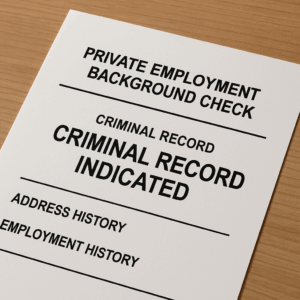Last Updated on July 26, 2025 by Keith E. McAndrews, Esquire

Even when the court grants your expungement, your criminal record may still show up online. This lingering “digital shadow” can appear on third-party websites, outdated databases, and third-party background checks used by employers, landlords and others. If you’ve expunged your criminal record in Pennsylvania, you need to understand where this damaging information exists and how to try to remove it.
Key Takeaways
- Getting Your Criminal Record Expunged Doesn’t Always Mean Your Record Disappears Online: Even after a judge grants your expungement, a “digital shadow” of your record can still live on in date-broker sites, news archives, mugshot websites, and other databases
- Verify First, Then Dispute: Get a certified copy of your expungement order and confirm that every government agency named in the court order actually destroyed your records before you start challenging third-party sites
- Use Your FCRA Rights: Under the Fair Credit Reporting Act (FCRA), you can send a copy of the expungement order to major background check companies, demand corrections, dispute inaccurate reports, and then re-check periodically
- Clean Up and Push Down: Ask online new sites, mugshot websites, and private third-party websites to remove inaccurate information about your expunged record while actively building positive content on professional websites to bury false information.
- Get Help from an Expungement Lawyer When Necessary: A Pennsylvania expungement lawyer can help you communicate with uncooperative data brokers and pursue FRCA claims if incorrect information costs you a job or housing
Bucks County Expungement Lawyer
Employers will check-make sure they see nothing. Want your criminal record gone? Contact me at (215) 752-5282 for a no-charge expungement review. I’ll verify your options, and if you are eligible for expungement, I will file fast. I have spent 15+years helping people clear their records.
Do you need more information about criminal expungement? Read: PA Criminal Record Expungement Lawyer for more details. Are you interested in expunging a summary offense? Review my page at: PA Summary Offense Expungement Lawyer.
What is a Digital Shadow?
A “digital shadow” refers to the presence of information about your past on the internet. It can include online criminal records, even after an official expungement or criminal record seal has been granted by a court.
An expungement legally removes or seals your record from official government databases (like court records, police databases, and state criminal history repositories). Unfortunately, the internet’s vast and decentralized nature means this information can still exist in various places online.
Where Can a Digital Shadow Appear?
- Third-Party Background Check Companies (Data Brokers): These companies collect and aggregate public record data, often scraping court websites, arrest logs, news articles, and police “crime watch” sites. They then sell this information to employers, landlords, and even individuals (ex, private investigators). Many of these companies do not regularly update their databases to reflect expungements, resulting in outdated information appearing online.
- News Archives and Online Publications: If your arrest or charges were reported by local news outlets, those articles may remain online indefinitely in their archives or on platforms like Google News and local online news platforms
- Social Media and Personal Websites: Any information you or others may have posted about your past on social media or personal blogs can still appear online
- Mugshot Websites: These sites often publish arrest photos and criminal charges, then charge a fee for removal
Why Your Digital Shadow Matters
Even with an expungement, a “digital shadow” can undermine the very purpose of clearing your record through expungement. Potential employers, landlords, or even just curious individuals can still discover this information.
As a result, this may cost you a job, an apartment lease, or cause other negative consequences, even though your record has been legally sealed or expunged.
What Are Third-Party Background Checks?
Third-party background check companies are businesses that specialize in compiling information about individuals for various purposes. They are commonly used for pre-employment screening, tenant screening, and professional licensing and certification
These companies draw data from a multitude of sources, including:
- Public Records: Court dockets, arrest records, sex offender registries, vital statistics
- Credit Bureaus: Experian, Equifax, TransUnion (includes credit history, financial judgments)
- Education Verification: Confirming degrees and attendance
- Employment Verification: Confirming past employment dates and titles
- Commercial Databases: Many background check companies maintain their own proprietary databases of criminal records, which they often purchase from government agencies or other data brokers
How Third-Party Background Checks Can Hurt You
Official government databases are required to update their records once a criminal record expungement order is issued. However, third-party background check companies don’t constantly revise their information quickly or automatically.
They may have outdated information in their databases, or their systems may not be designed to regularly purge expunged records. This means an expunged record might still appear on a background check conducted by one of these companies.
What Should I Do if My Record Shows up After Expungement?
It’s important to recognize that completely erasing your digital footprint may be impossible due to the pervasive nature of online information. However, there are proactive steps you can take to lessen its impact after an expungement, including the following:
Ensure Your Expungement is Complete and Verified
- Get a Certified Copy of your Expungement Order from the County Clerk of Courts Office as proof that your criminal record has been legally expunged
- Confirm with relevant courts, county agencies, local police departments, PA state police, and state criminal history repositories (AOPC) that your record has been removed or sealed in their official systems
Contact Third-Party Background Check Companies
If you believe third-party background check companies are reporting inaccurate or outdated information about you, do the following:
- Research the largest and most commonly used background check companies (ex., LexisNexus, Sterling, Checkr, Accurint)
- Send a copy of your certified Expungement Order to these companies and request that they update their records
- Most background check companies have a “dispute” process under the Fair Credit Reporting Act (FCRA)
- The FCRA gives you the right to request a free copy of your background check report from the businesses.
- Request your background reports periodically to check that the expunged information is no longer appearing (if it is, dispute it again)
Reach Out to Online News and Mugshot Websites
- If news articles or mugshots of you appear online, contact the website administrators directly and provide them with your expungement order and request that they remove the information.
- Some sites may comply with your request, especially if the information is no longer considered public record
- Research your state’s privacy laws (mugshot law) to determine if private companies are required by law to remove your mugshot and arrest information after expungement
- Consider using content removal companies that offer services to remove negative online information
Manage Your Online Presence
- Enter your name through Google Search, ChatGPT, Perplexity AI, and Google Gemini AI to see what information appears
- Create and maintain a strong professional online presence (ex., LinkedIn profile, professional video, and blog posting) to push older negative information further down search results and AI overviews
- Be careful about what you post online and what you allow others to post about you
If Necessary, Seek Legal Help
- An experienced expungement lawyer can help you attempt to clear your record if you are having difficulties on your own
- An expungement attorney may provide you with different strategies to remove your digital shadow and deal with third-party background check companies
Consider Filing a Lawsuit Under the FCRA
When a background check company continues to report false information, despite your efforts, you may be able to sue them under the Fair Credit Reporting Act (FCRA)
The Fair Credit Reporting Act applies if a company is compiling or selling a “consumer report” for:
- Employment background screening firms
- Tenant screening businesses
- Credit bureaus
- Other data brokers
Conclusion
While receiving a criminal record expungement is a powerful legal tool, it is often just the first step in clearing your online record. To protect your reputation and future personal and professional opportunities, you must diligently monitor what appears online about you.





